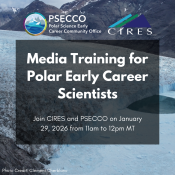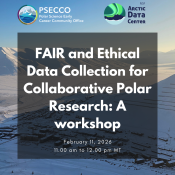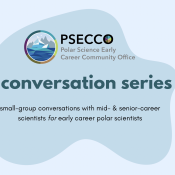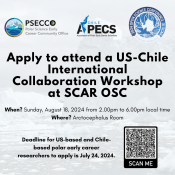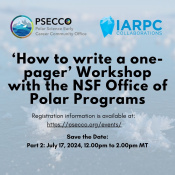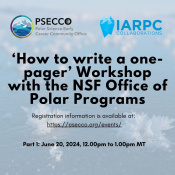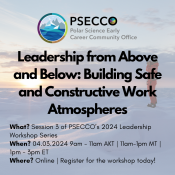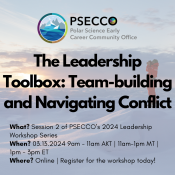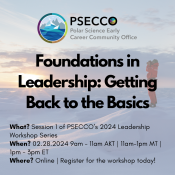Professional Development
On January 29, 2026, the Polar Science Early Career Community Office (PSECCO) hosted Lauren Lipuma, the Scientific Communications Editor from the Cooperative Institute for Research in Environmental Sciences (CIRES) to talk about what makes science newsworthy and how to prepare for media interviews.
On February 11, 2026, the Polar Science Early Career Community Office (PSECCO) hosted an interactive workshop co-hosted with the Arctic Data Center. The workshop was designed to equip polar researchers with the knowledge and resources necessary to navigate the complexities of ethical data collection and management and open data sharing.
The PSECCO conversation series provided an informal 1-hour discussion space for early career scientists to explore a topic of interest with a more experienced researcher with considerable success in the topic area. Participants had the opportunity to steer the conversation by submitting topic-related questions prior to the event.
The PSECCO conversation series provided an informal 1-hour discussion space for early career scientists to explore a topic of interest with a more experienced researcher with considerable success in the topic area. Participants had the opportunity to steer the conversation by submitting topic-related questions prior to the event.
US-based and Chile-based polar early career researchers attending the 2024 Scientific Committee on Antarctic Research (SCAR) Open Science Meeting were welcomed to apply to attend a workshop on establishing international collaborative relationships!
Join NSF Office of Polar Program (OPP) Program Officers (supported by PSECCO and IARPC Collaborations) to learn how to write a one-pager to summarize an idea you want to pitch to a funding agency. This workshop is open to polar early career scientists and you must have attended the first workshop to attend the second workshop.
Join NSF Office of Polar Program (OPP) Program Officers (supported by PSECCO and IARPC Collaborations) to learn how to write a one-pager to summarize an idea you want to pitch to a funding agency. This workshop series is open to polar early career scientists and will be run in two parts.
“A leader is anyone who takes responsibility for finding the potential in people and processes, and who has the courage to develop that potential.” –Brené Brown
Leaders do not avoid, repress, or deny conflict, but rather see it as an opportunity. -Warren G. Bennis
A leader is best when people barely know they exist. When their work is done, their aim fulfilled, the people will say: we did it ourselves. –Lau Tzu
Pagination
- Page 1
- Next page
